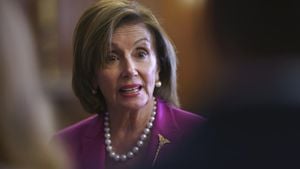On December 13, 2024, McKinsey & Company made headlines after agreeing to pay $650 million as part of a settlement arising from its controversial role in the U.S. opioid crisis. This significant payment is indicative of the continuing fallout from the epidemic, which has claimed hundreds of thousands of lives over the past few decades. The agreement with the U.S. Department of Justice (DOJ) is part of a deferred prosecution deal, meaning McKinsey will avoid formal charges if it adheres to certain conditions over the next five years.
At the heart of this matter lies McKinsey's consulting work with Purdue Pharma, the makers of the powerful painkiller OxyContin. The consulting firm was accused of collaborating with Purdue to boost sales of the drug, which has been heavily implicated in opioid-related overdoses and addiction. According to court documents, prosecutors allege McKinsey “knowingly and intentionally” conspired with Purdue to misbrand the drug, offering strategic advice to ramp up the marketing and distribution of OxyContin even as evidence emerged of its addictive potential.
McKinsey's actions came under scrutiny as the opioid crisis began to escalate significantly. Federal prosecutors revealed details of how the firm assisted Purdue by identifying which medical prescribers could be targeted to increase opioid prescriptions effectively. The firm’s methods reportedly included helping Purdue craft marketing strategies aimed at maximizing profits from OxyContin, regardless of the health risks associated with its consumption.
Former McKinsey senior partner Martin Elling will also face legal repercussions; he has agreed to plead guilty to obstruction of justice for deleting emails and records related to his work with Purdue after learning of the investigations. Elling's actions have raised alarms about accountability within high-profile consulting firms, particularly relating to their ethical conduct.
Despite the hefty settlement, McKinsey issued a statement reflecting on its regrettable past with Purdue. “We are deeply sorry for our past client service to Purdue Pharma and the actions of a former partner who deleted documents related to his work for the client,” the company expressed. McKinsey emphasized the realization of the societal harm caused by opioids and accepted the regret associated with their involvement in the marketing and sale of OxyContin. The crisis has led to approximately 80,000 annual deaths linked to opioid overdoses, largely attributed to illicit drugs such as fentanyl, which emerged as the primary threat more recently.
The plea and settlement mark one of the most pivotal actions taken against consulting firms, challenging the long-held notion of limited accountability for external advisers. Joshua Levy, the U.S. Attorney for Massachusetts, articulated this shift by asserting, “If a consulting firm conspires with a client to engage in criminal conduct, being just an outside consultant won’t protect you from the consequences.” This approach ushers in stronger accountability measures for consulting firms, reiteratively emphasizing ethical guidelines for their engagements and advisory roles.
The DOJ classified this agreement as ground-breaking, as it signals the first time one of the consulting giants has faced this level of legal scrutiny and accountability over advisory roles leading to criminal offenses. "This resolution marks the first time a management consulting firm has been held criminally responsible for advice the firm has provided resulting in the commission of crimes by clients,” added Christopher Kavanaugh, the U.S. Attorney for the Western District of Virginia.
The opioid crisis itself began to capture national attention seriously after OxyContin hit the market back in 1996. Many analysts indicate the ramifications of Purdue’s aggressive marketing strategies underpinned the surge of opioid prescriptions and the subsequent rise of addiction. Some advocates argue the resulting consequences of the crisis have effectively shaped the legislative and regulatory responses enacted at both federal and state levels over the past several years.
Over the past decade, significant lawsuits and settlements have emerged involving Purdue Pharma and similar companies, collectively totaling about $50 billion. Purdue Pharma has been directly embroiled in legal battles, including its 2020 guilty plea to various charges, culminating in roughly $8.3 billion worth of penalties, which were conditional upon successful bankruptcy proceedings. McKinsey’s prior settlements have approached nearly $1 billion, which encompass various state and local agreements addressing their role related to opioid manufacturers.
Among the agreement's stipulations, McKinsey must cease any engagement with the marketing, distribution, and promotion of controlled substances, symbolizing the firm’s intent to amend its business practices following previous controversies associated with opioid manufacturers. The settlement is expected to bring some resolution to the company's longstanding trauma relating to the opioid epidemic, with McKinsey proclaiming, "This resolution brings closure to this chapter of our firm’s history.”
Legal analysts are closely watching how subsequent actions will be organized as part of McKinsey's compliance practices. Moving forward, this case may set precedents concerning corporate accountability, the role of consultants, and the continuing efforts to combat the systemic issues related to the opioid crisis. The path concluded this Friday seeks to drive home the message about ethical responsibility, illuminating how deeply woven the fabric of corporate conduct is intertwined with public health matters.
With every dollar allocated from settlements found and doled out to abate the effects of this unprecedented crisis, stakeholders are hopeful about improving community health outcomes, preventing future misuse of opioids, and steering clear of the harrowing cycles of addiction. The settlement may prompt greater scrutiny and reflection across industries where consulting firms have been deeply engrained within operations impacting public health and safety.
For attorneys representing the victims affected by the opioid crisis, the closure of this chapter with McKinsey serves as another step toward accountability. The executives, ethical advisors, and all implicated parties will be held to higher standards as society confronts the remnants of this harrowing health crisis.



